Marketing communications. SECTION 19. 1 What You’ll Learn



























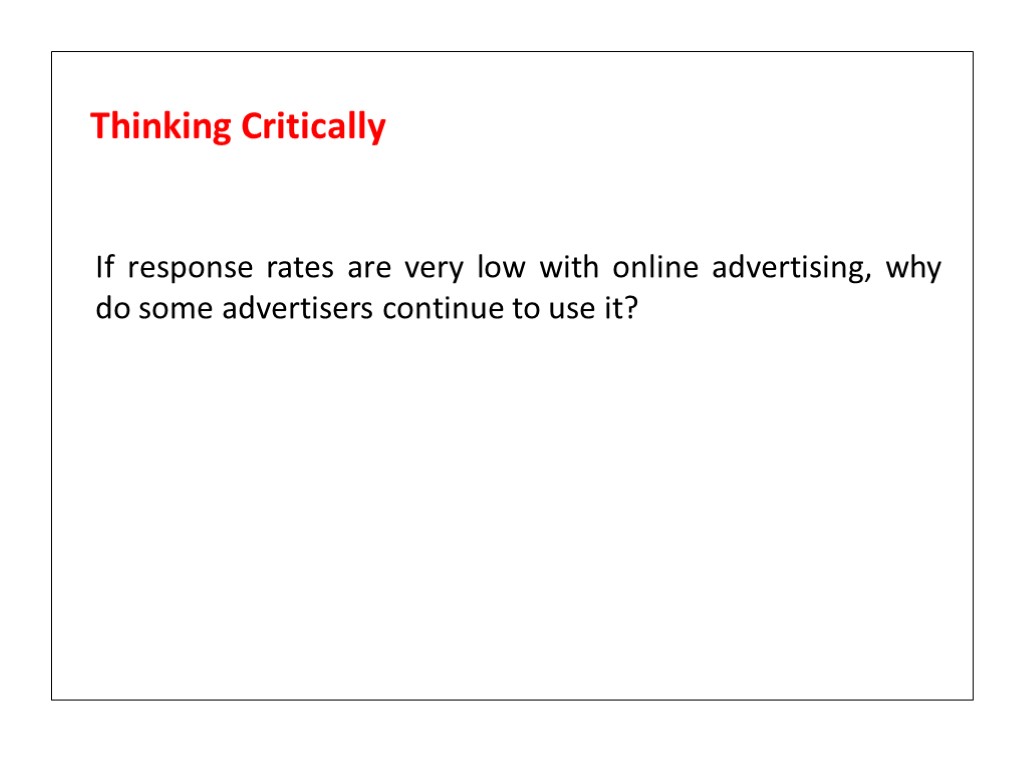
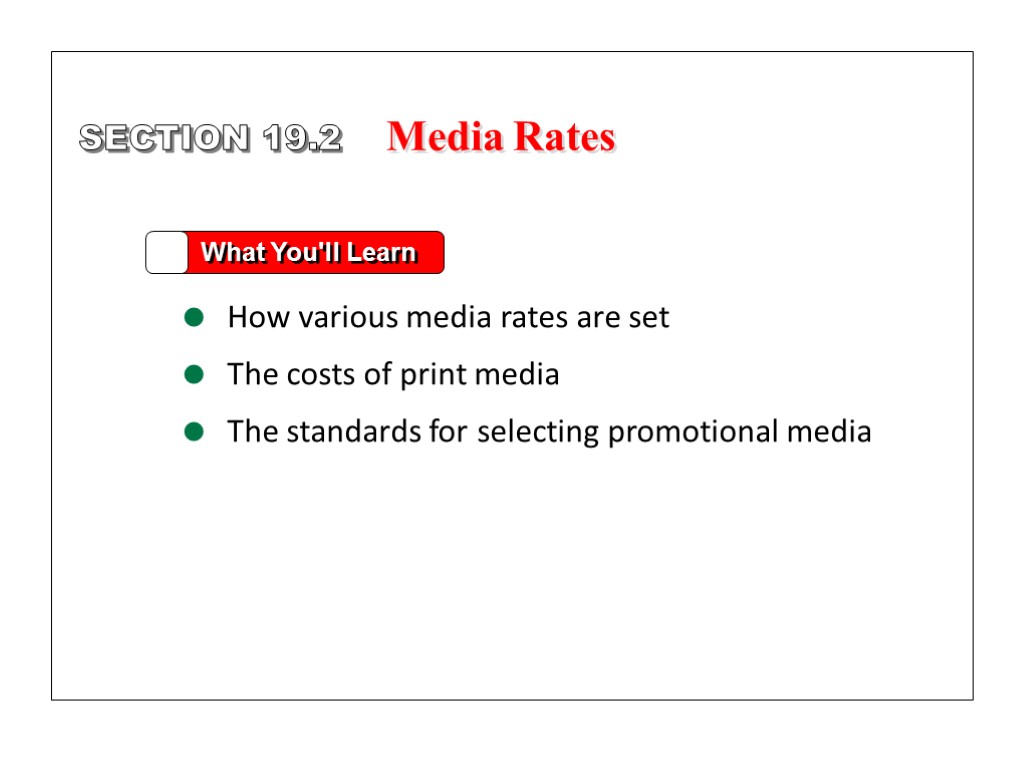
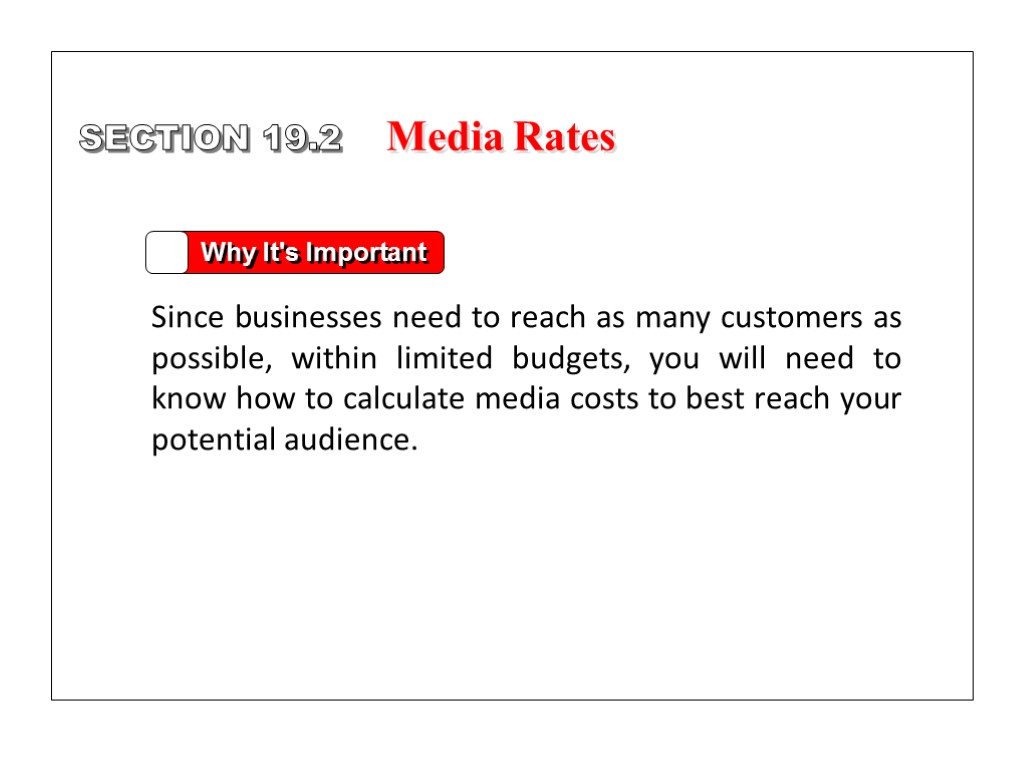
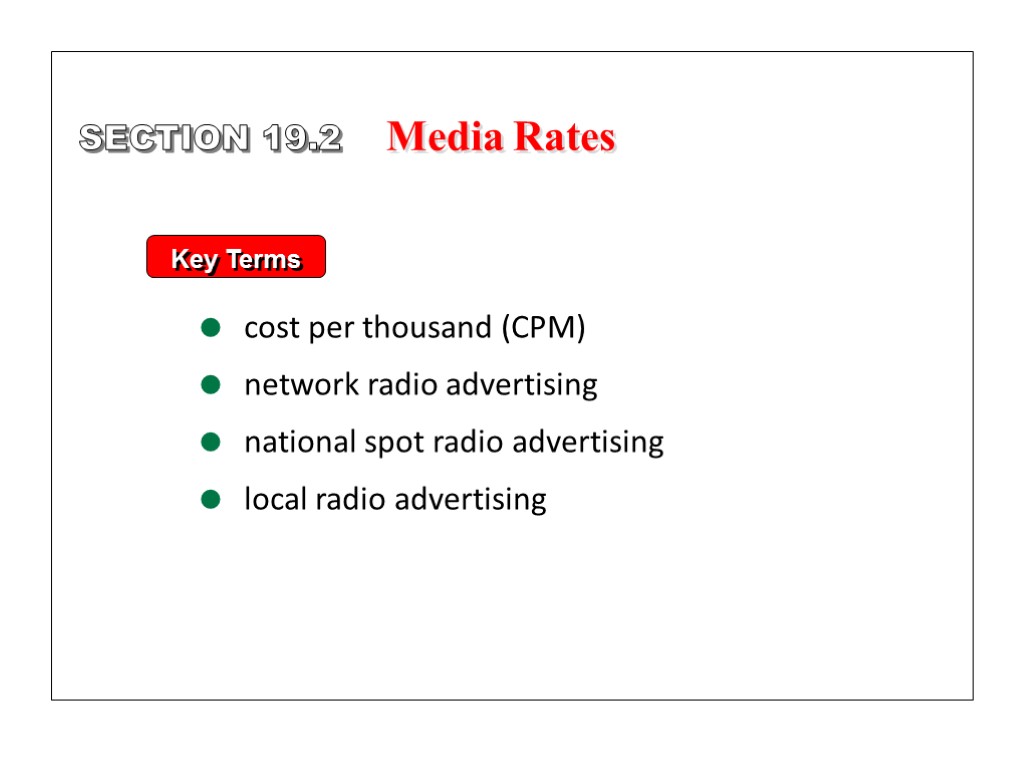
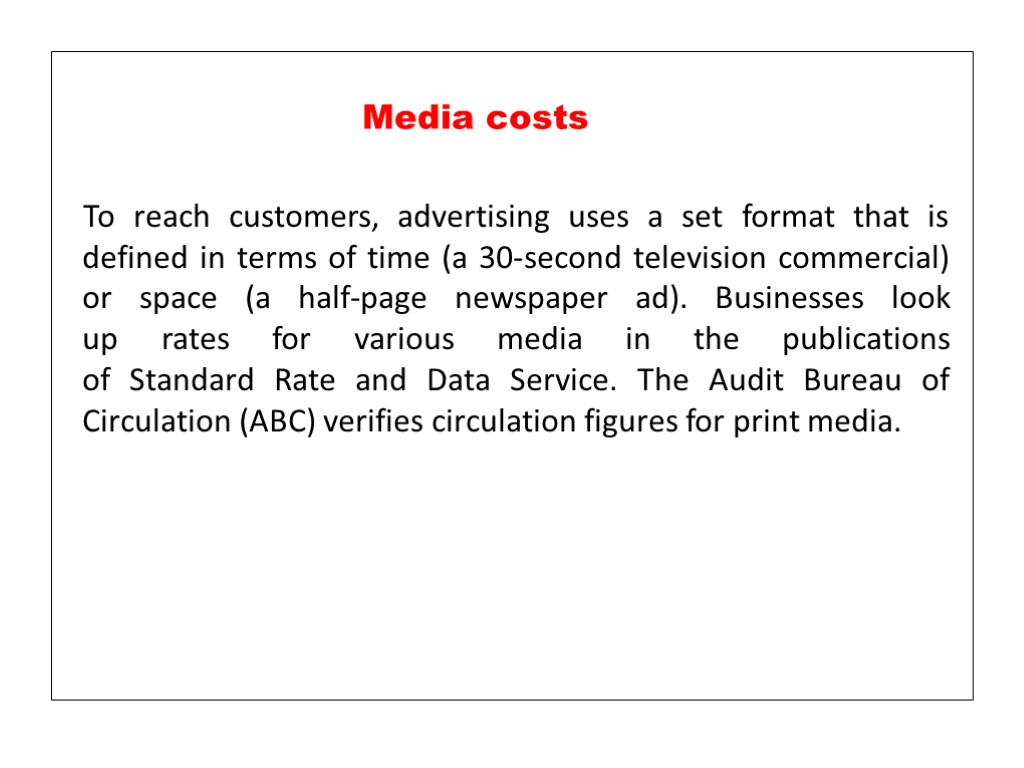
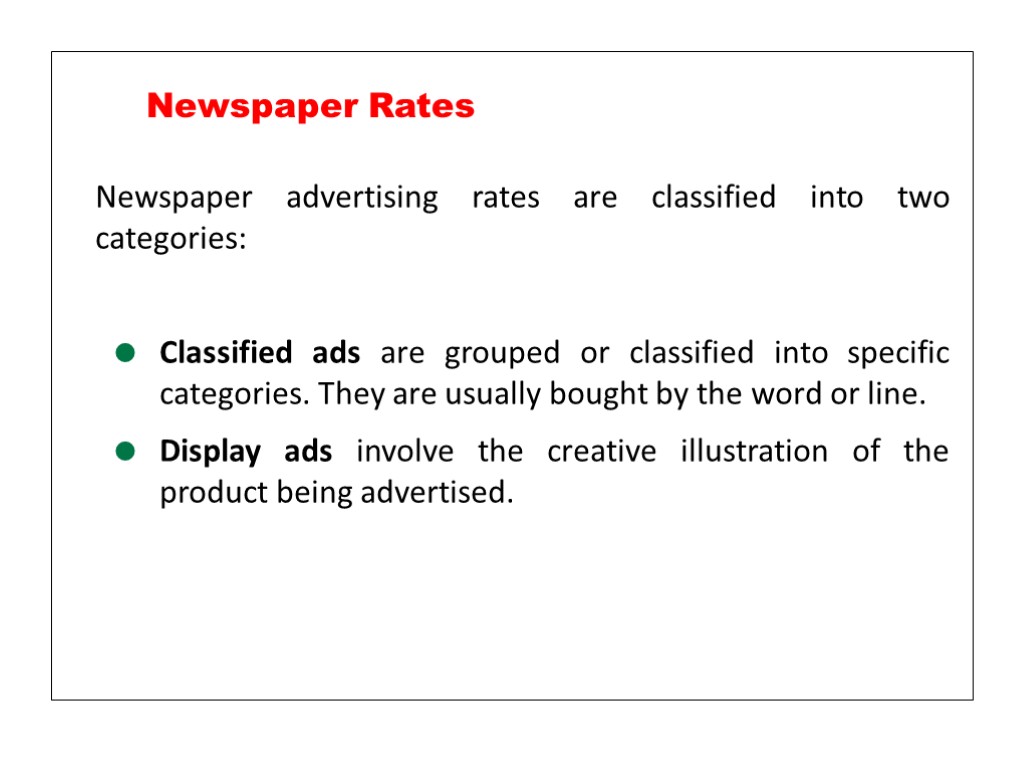
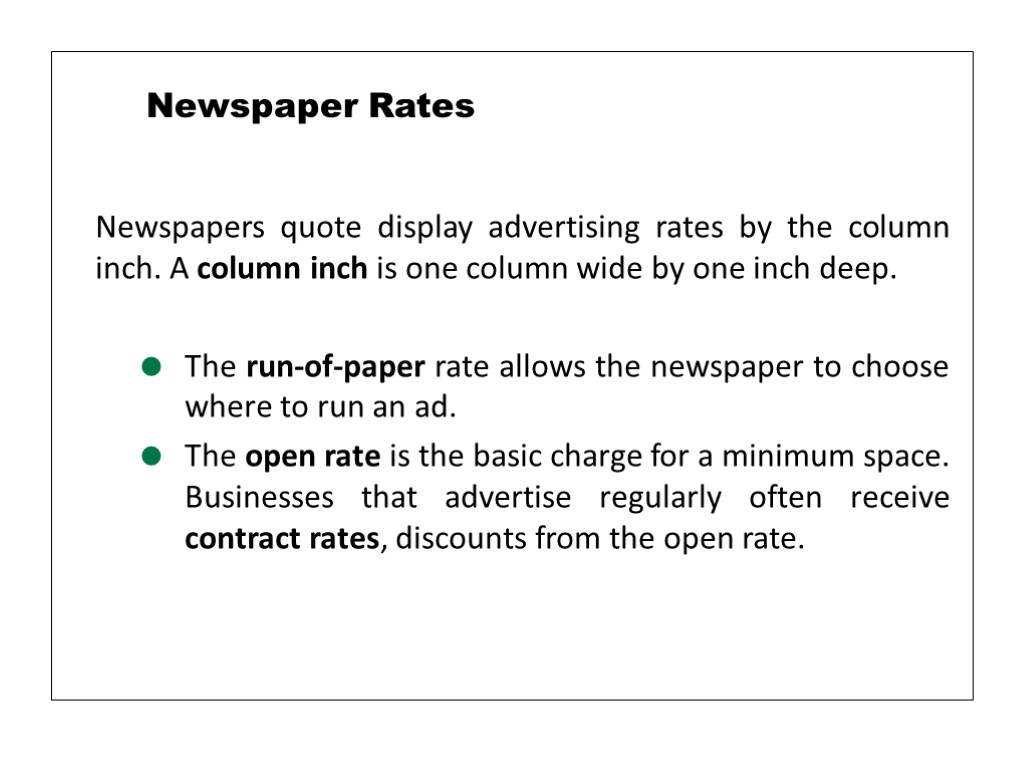
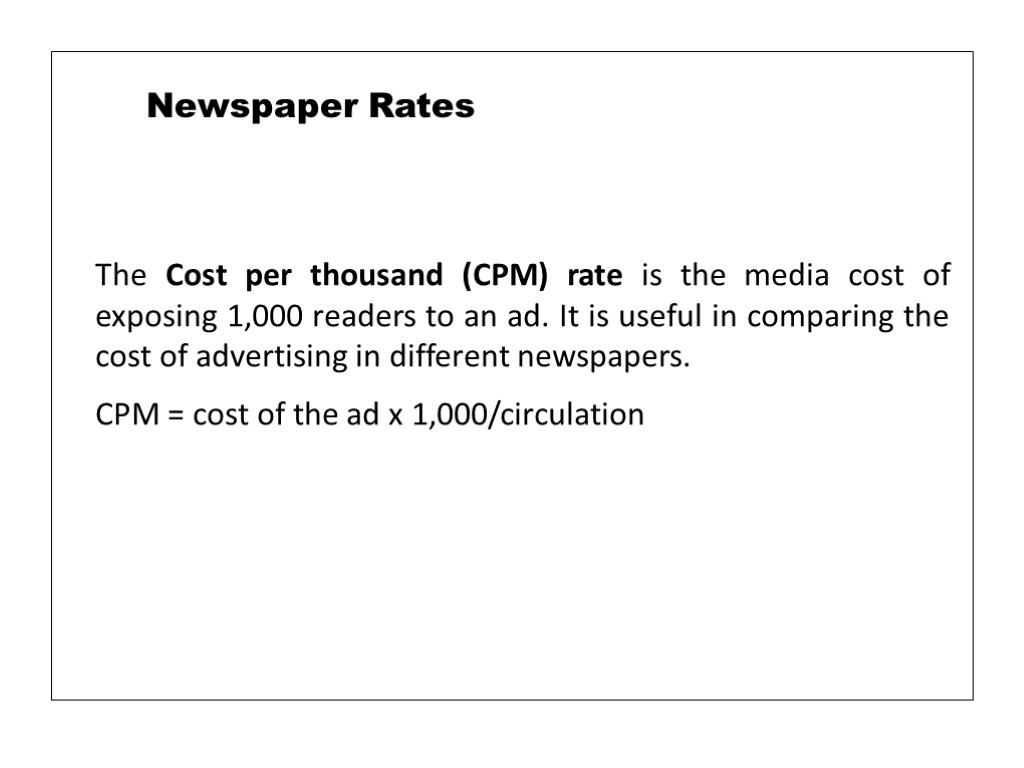
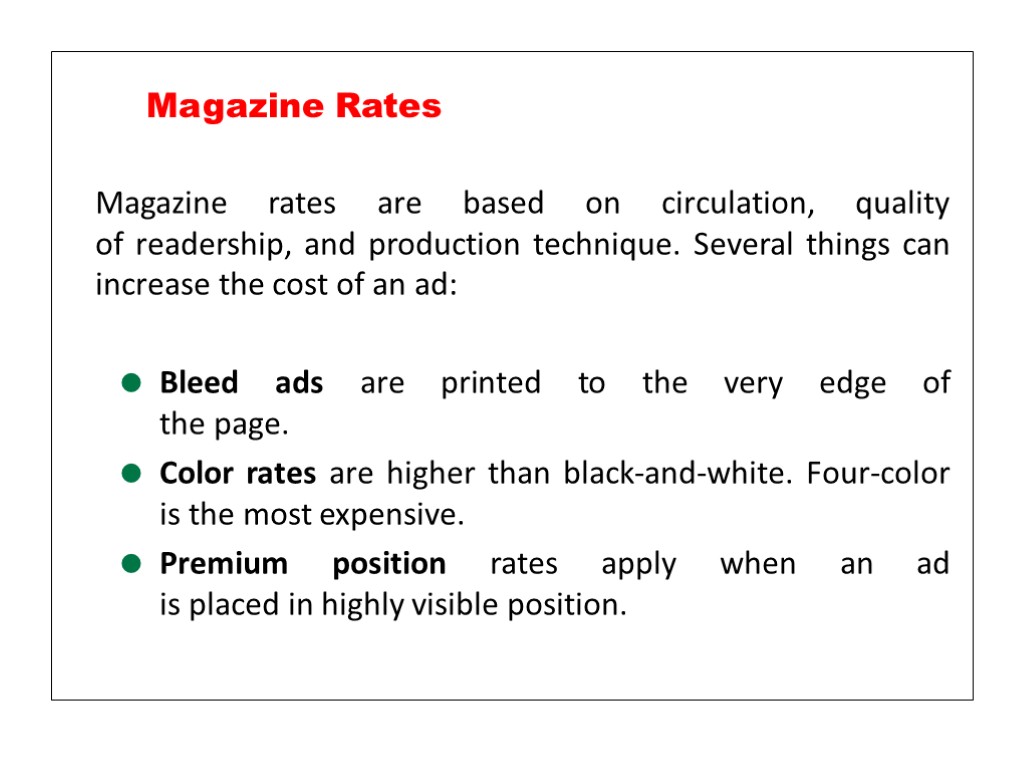

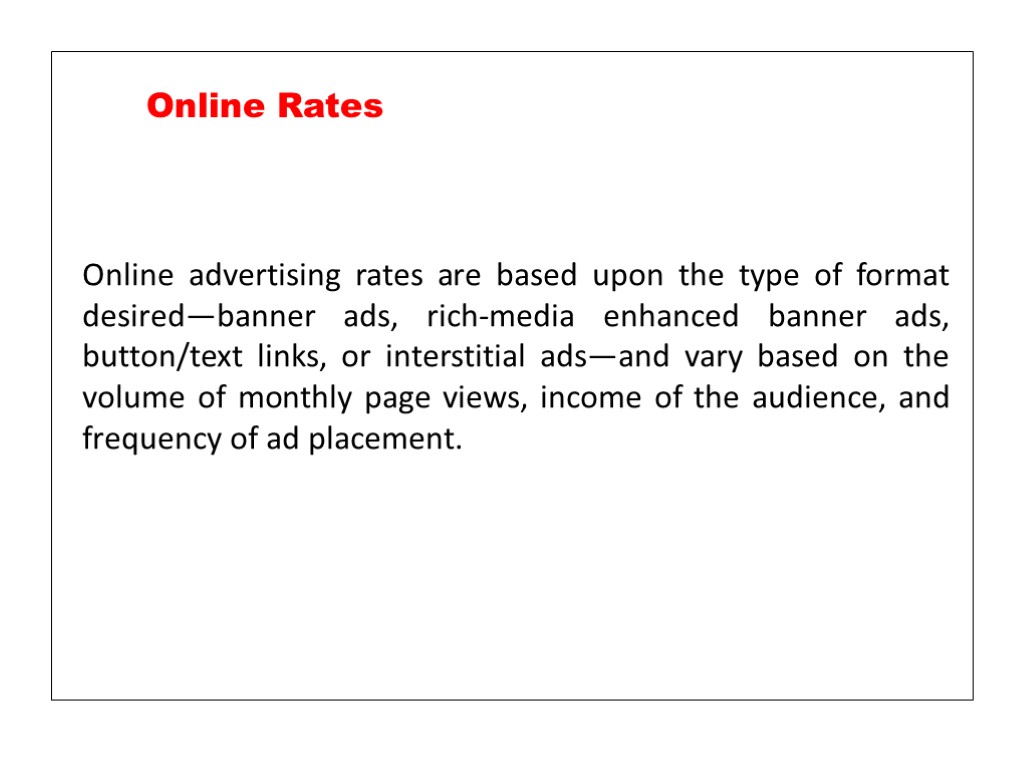
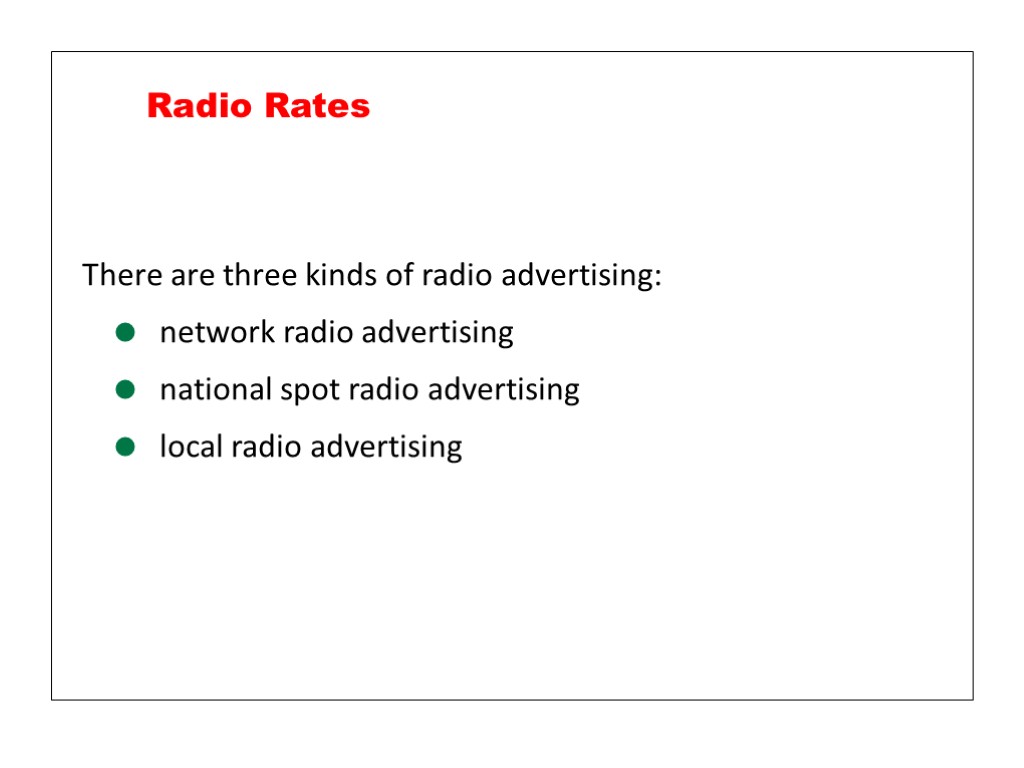
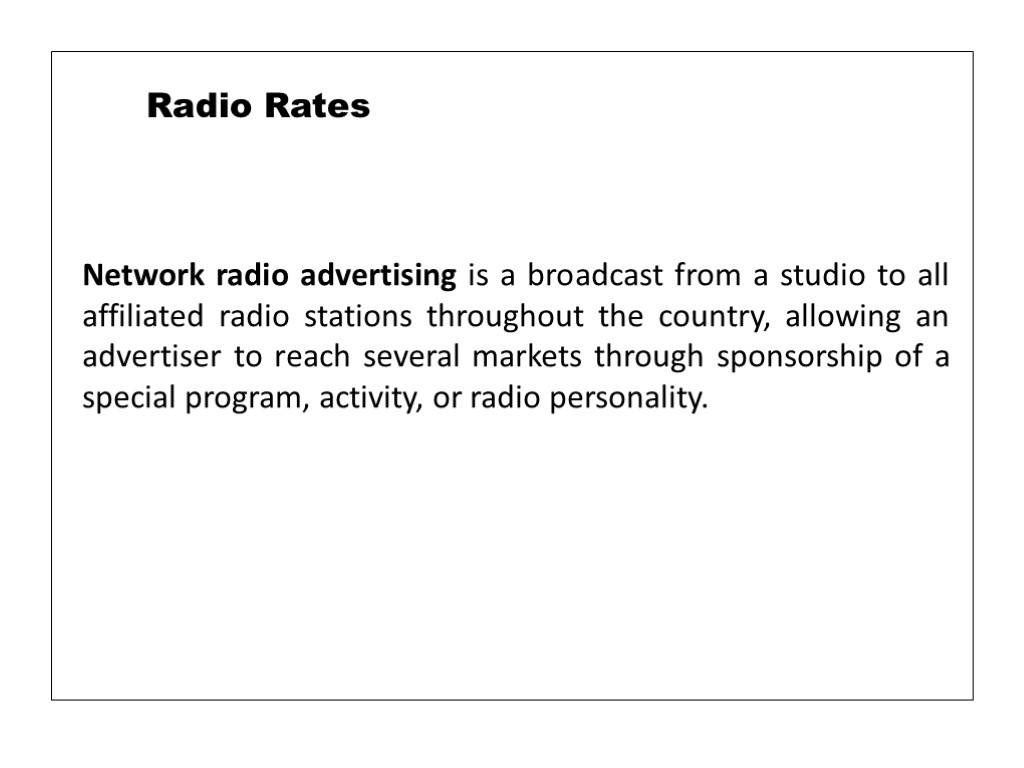
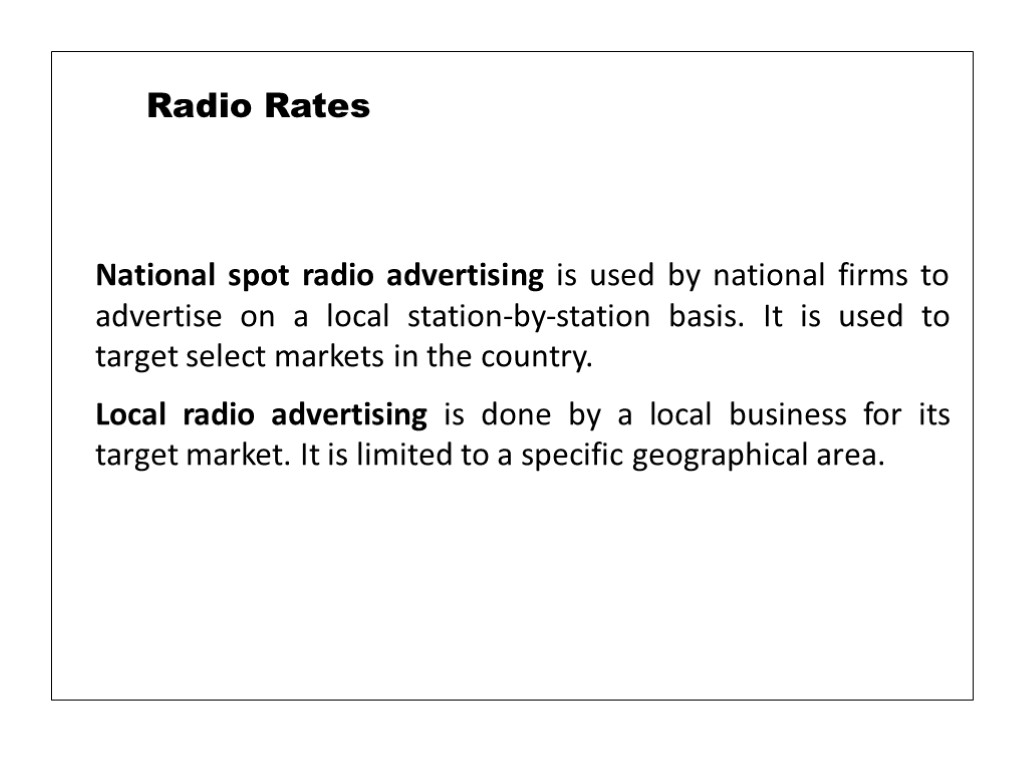
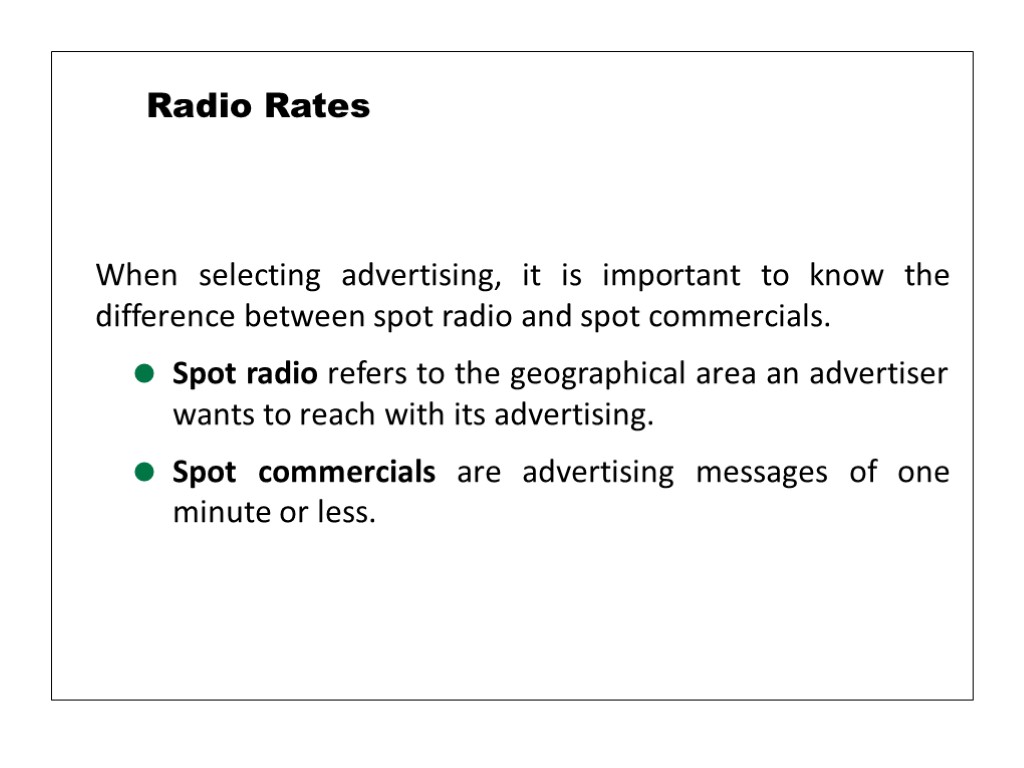
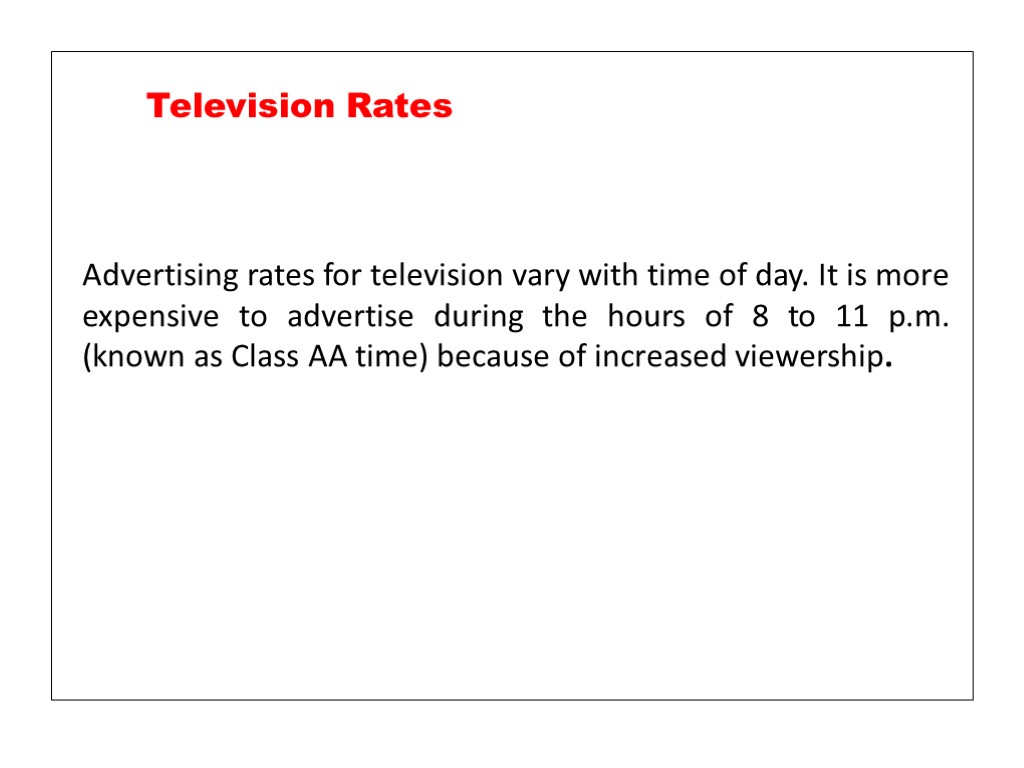
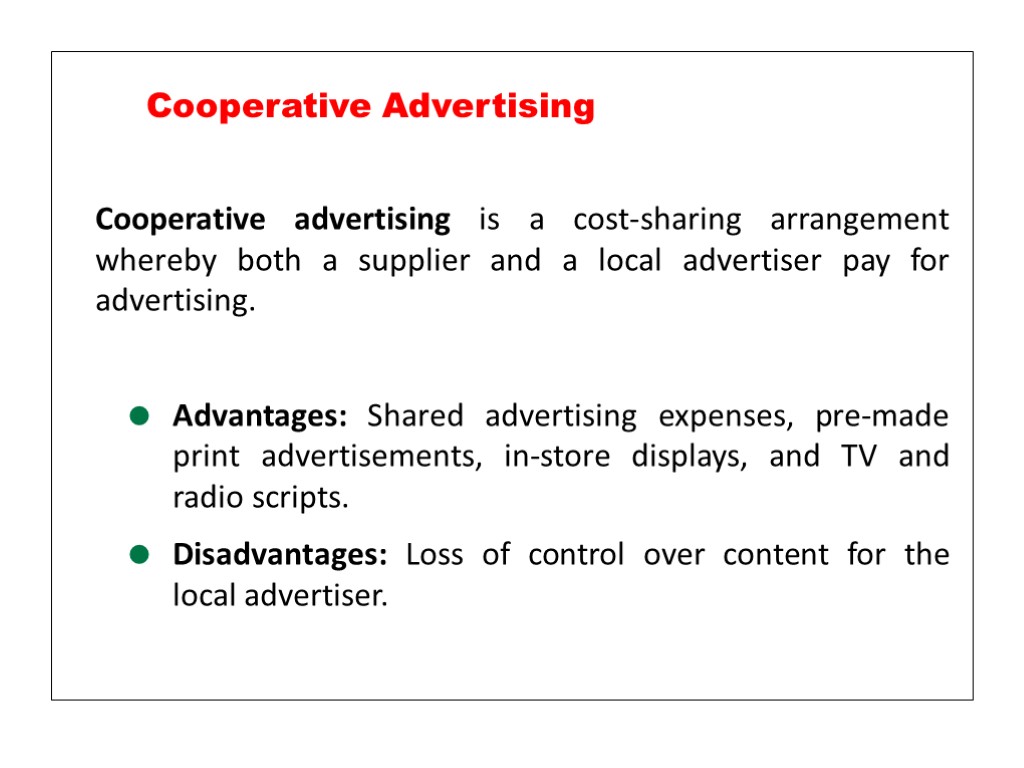
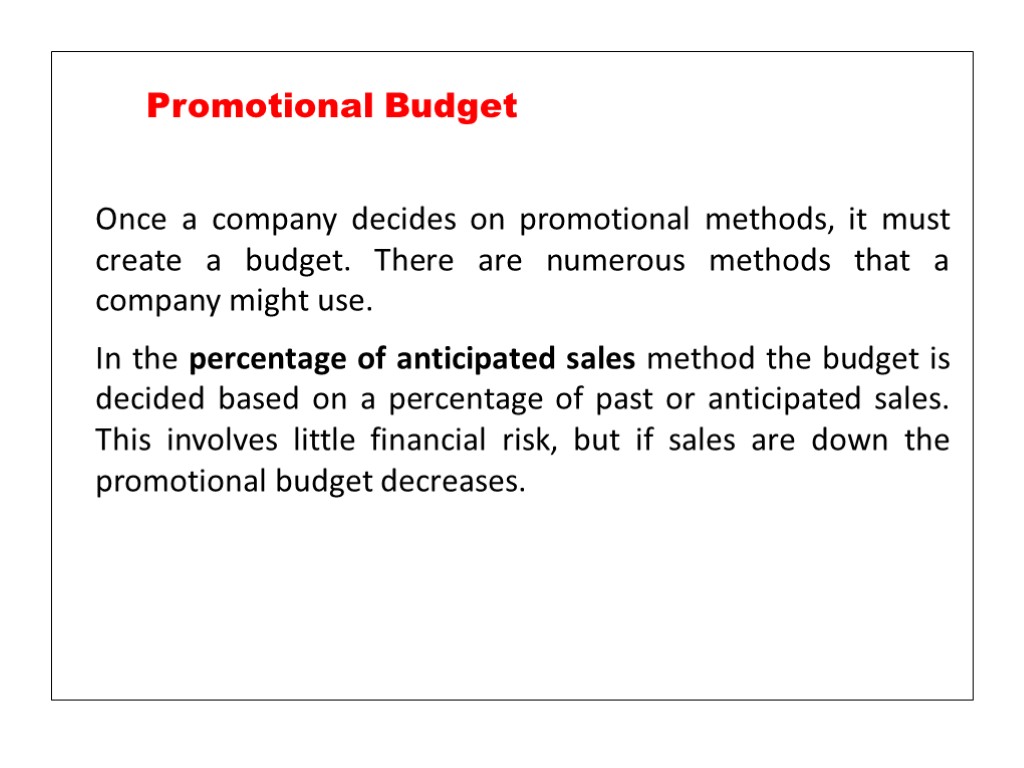
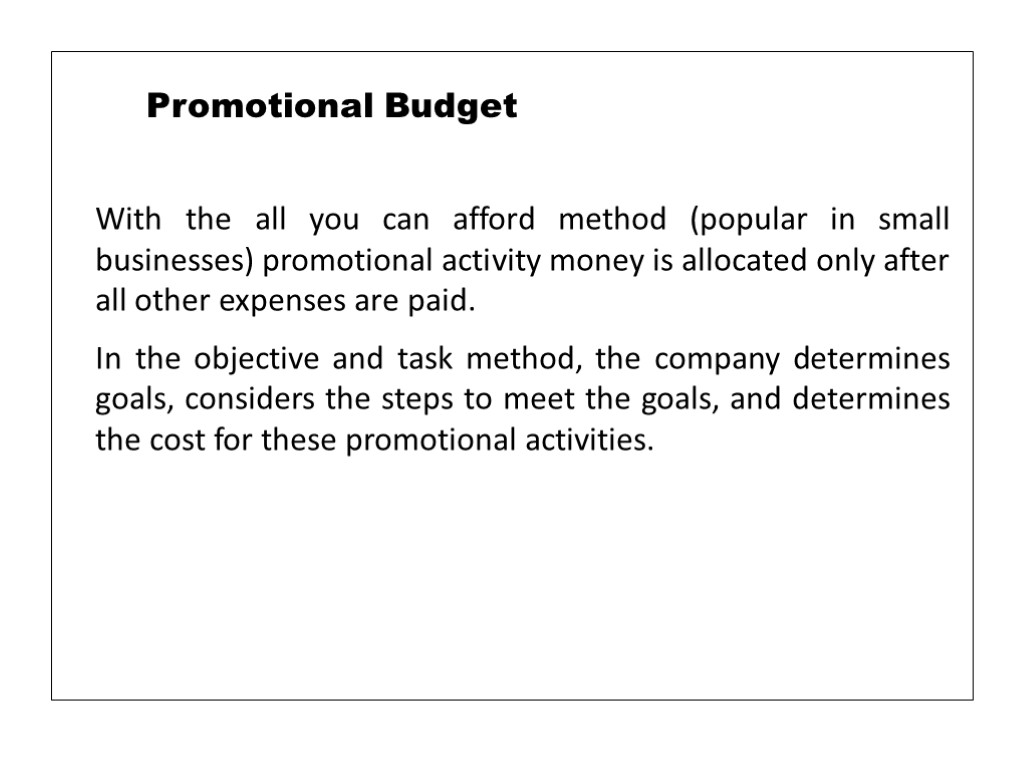
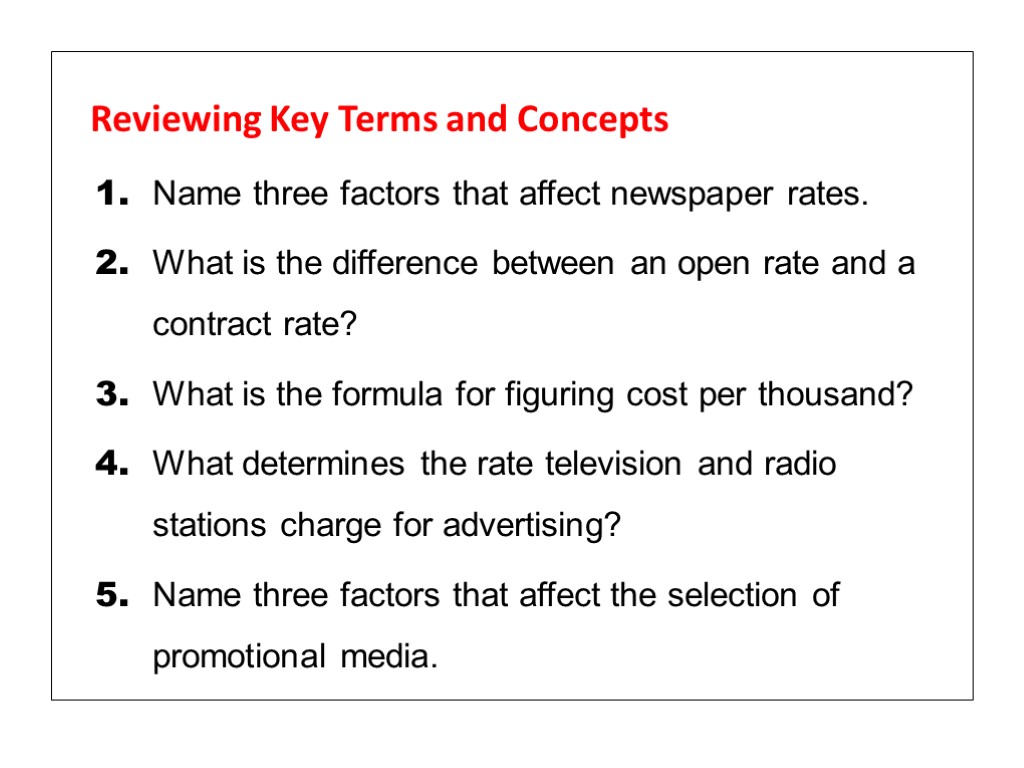
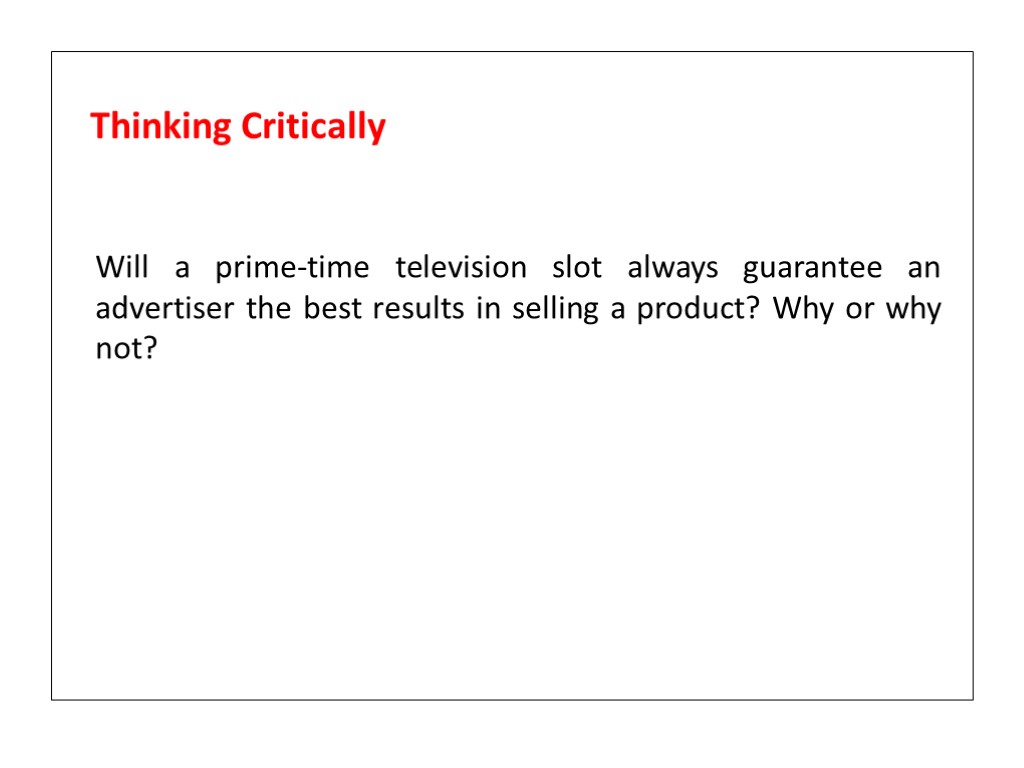
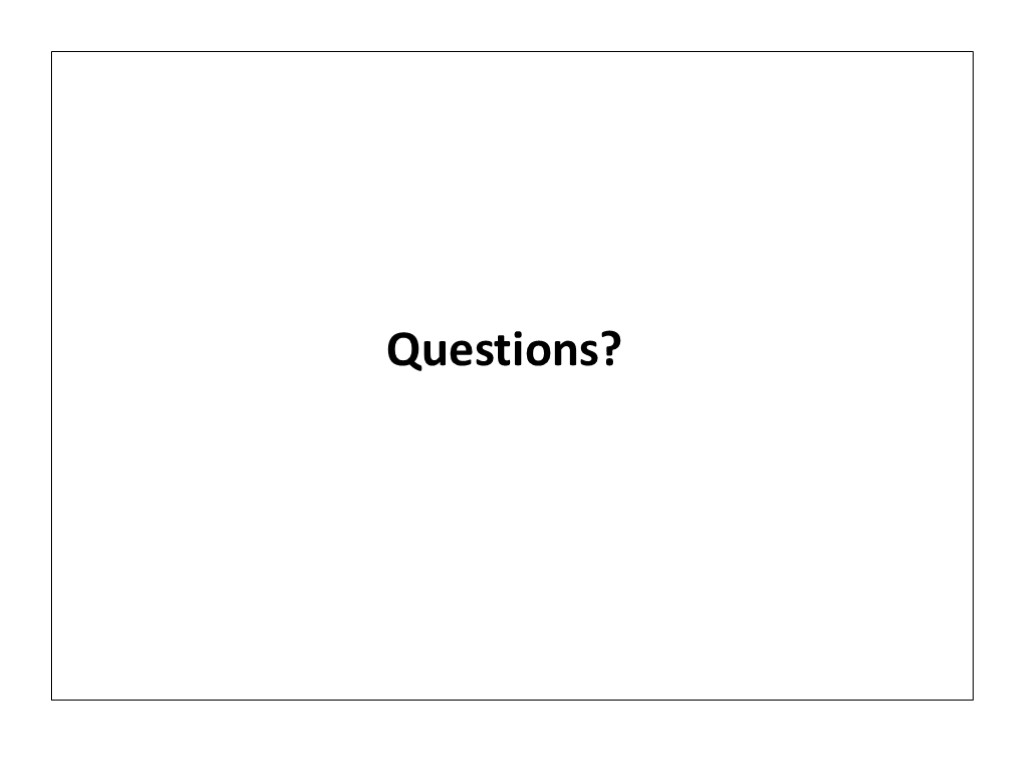
marketing_communications_session_3.pptx
- Количество слайдов: 48
 Marketing communications
Marketing communications
 SECTION 19.1 What You'll Learn The concept and purpose of advertising Types of advertising media Advertising Media
SECTION 19.1 What You'll Learn The concept and purpose of advertising Types of advertising media Advertising Media
 SECTION 19.1 Why It's Important Since advertising is an important element of promotion, you will need to know about the different ways a business can use advertising media to promote its image and products. Advertising Media
SECTION 19.1 Why It's Important Since advertising is an important element of promotion, you will need to know about the different ways a business can use advertising media to promote its image and products. Advertising Media
 SECTION 19.1 Key Terms promotional advertising institutional advertising media print media broadcast media online advertising banner specialty media Advertising Media
SECTION 19.1 Key Terms promotional advertising institutional advertising media print media broadcast media online advertising banner specialty media Advertising Media
 Promotion is any form of communication a business or organization uses to inform, persuade, or remind people about its products. Promotional mix is a combination of the different types of promotion. A business decides on the promotional mix that will be most effective in persuading potential customers to purchase its products. The Concept of the Promotional Mix
Promotion is any form of communication a business or organization uses to inform, persuade, or remind people about its products. Promotional mix is a combination of the different types of promotion. A business decides on the promotional mix that will be most effective in persuading potential customers to purchase its products. The Concept of the Promotional Mix
 Types of Promotion There are four basic types of promotion: personal selling advertising sales promotion public relations
Types of Promotion There are four basic types of promotion: personal selling advertising sales promotion public relations
 Advertising is any paid form of non-personal promotion of ideas, goods, or services by an identified sponsor. Advertising is either promotional or institutional. Promotional advertising is designed to increase sales. It introduces new products and businesses, encourages an interest in products, and explains products and service features. Institutional advertising attempts to create a favorable impression and goodwill for a business or an organization by providing positive information about a business. Advertising and its Purpose
Advertising is any paid form of non-personal promotion of ideas, goods, or services by an identified sponsor. Advertising is either promotional or institutional. Promotional advertising is designed to increase sales. It introduces new products and businesses, encourages an interest in products, and explains products and service features. Institutional advertising attempts to create a favorable impression and goodwill for a business or an organization by providing positive information about a business. Advertising and its Purpose
 While there are advantages to advertising, it does have its drawbacks. Advertising can: fail to focus on individual needs be expensive be wasteful when it is seen by people who are not potential customers lack depth Advertising Drawbacks
While there are advantages to advertising, it does have its drawbacks. Advertising can: fail to focus on individual needs be expensive be wasteful when it is seen by people who are not potential customers lack depth Advertising Drawbacks
 Media are the agencies, means, or instruments used to convey advertising messages to the public. The three general categories of advertising media are: print broadcast specialty Types of media
Media are the agencies, means, or instruments used to convey advertising messages to the public. The three general categories of advertising media are: print broadcast specialty Types of media
 Advertising Media Expenditures U.S. Advertising Expenditures Advertising is a multibillion-dollar business. Given the figures shown in the pie chart, calculate the total spent on advertising among all types of media. Why do you think television and newspapers bring in the most advertising expenditures?
Advertising Media Expenditures U.S. Advertising Expenditures Advertising is a multibillion-dollar business. Given the figures shown in the pie chart, calculate the total spent on advertising among all types of media. Why do you think television and newspapers bring in the most advertising expenditures?
 Print media is written advertising, included in everything from newspapers and magazines to direct mail, signs, and billboards. These are among the oldest and most effective forms of advertising. Print media
Print media is written advertising, included in everything from newspapers and magazines to direct mail, signs, and billboards. These are among the oldest and most effective forms of advertising. Print media
 Newspapers—daily or weekly, local, regional, or national—are the main form of print media for many businesses. Advantages: Newspapers have large readership and a high level of reader involvement. Disadvantages: Circulation can be wasted, advertising life is short, and ads are less appealing in black and white. Newspaper Advertising
Newspapers—daily or weekly, local, regional, or national—are the main form of print media for many businesses. Advantages: Newspapers have large readership and a high level of reader involvement. Disadvantages: Circulation can be wasted, advertising life is short, and ads are less appealing in black and white. Newspaper Advertising
 Both consumer and trade magazines generate a high level of reader involvement. Magazines can target specific regional areas or interest groups. Advantages: Targeted audience, longer life span, more likely to be remembered, better print quality, variety of formats. Disadvantages: Less mass appeal within a geographic area, more expensive, not very timely. Magazine Advertising
Both consumer and trade magazines generate a high level of reader involvement. Magazines can target specific regional areas or interest groups. Advantages: Targeted audience, longer life span, more likely to be remembered, better print quality, variety of formats. Disadvantages: Less mass appeal within a geographic area, more expensive, not very timely. Magazine Advertising
 Direct-mail advertising is sent by businesses directly through the mail to prospective customers. Types of direct-mail advertising include newsletters, catalogs, coupons, samplers, price lists, and others. Advantages: Highly selective distribution, variety of sizes and formats, catalogs and coupons can actually make a sale. Disadvantages: Low response rate, high costs. Direct-mail Advertising
Direct-mail advertising is sent by businesses directly through the mail to prospective customers. Types of direct-mail advertising include newsletters, catalogs, coupons, samplers, price lists, and others. Advantages: Highly selective distribution, variety of sizes and formats, catalogs and coupons can actually make a sale. Disadvantages: Low response rate, high costs. Direct-mail Advertising
 Telephone directories are the best known directories. They are divided into the White Pages (free alphabetical listings) and the Yellow Pages (paid categorical listings and free alphabetical listings for businesses). Advantages: Relatively inexpensive, used by all demographic groups, long life span. Disadvantages: Not timely. Directory Advertising
Telephone directories are the best known directories. They are divided into the White Pages (free alphabetical listings) and the Yellow Pages (paid categorical listings and free alphabetical listings for businesses). Advantages: Relatively inexpensive, used by all demographic groups, long life span. Disadvantages: Not timely. Directory Advertising
 Outdoor signs are better known as billboards. Advantages: Broad exposure, highly visible, some can be changed quickly. Disadvantages: Use is restricted in some areas, limited viewing time, unknown audience. Outdoor advertising
Outdoor signs are better known as billboards. Advantages: Broad exposure, highly visible, some can be changed quickly. Disadvantages: Use is restricted in some areas, limited viewing time, unknown audience. Outdoor advertising
 Transit advertising includes printed posters found inside business and commuter trains, exterior posters on taxis and buses, and station posters located near or in subways and in railroad, bus, and airline terminals. Advantages: Reaches a wide and captive audience and is a relatively economical media. Disadvantages: Unavailable in some areas, restricted to transit routes. Transit Advertising
Transit advertising includes printed posters found inside business and commuter trains, exterior posters on taxis and buses, and station posters located near or in subways and in railroad, bus, and airline terminals. Advantages: Reaches a wide and captive audience and is a relatively economical media. Disadvantages: Unavailable in some areas, restricted to transit routes. Transit Advertising
 Broadcast media include radio and television. The average person will spend nearly ten years watching television and almost six years listening to the radio over a lifetime. People are more likely to believe information they get from television than from print media. Broadcast media
Broadcast media include radio and television. The average person will spend nearly ten years watching television and almost six years listening to the radio over a lifetime. People are more likely to believe information they get from television than from print media. Broadcast media
 Television is the ultimate advertising medium for many businesses because it can communicate a message with sound, action, and color. Advantages: Can be directed at a specific audience, is timely, takes advantage of holidays and special events. Disadvantages: Highest production costs, high cost for time, audience is not assured. Television Advertising
Television is the ultimate advertising medium for many businesses because it can communicate a message with sound, action, and color. Advantages: Can be directed at a specific audience, is timely, takes advantage of holidays and special events. Disadvantages: Highest production costs, high cost for time, audience is not assured. Television Advertising
 It is estimated that radio reaches 96 percent of all people age 12 and over in a given week. Advantages: "Drive times" can provide concentrated audience, specific audiences can be targeted, is flexible, and mobile. Disadvantages: Short life span, stations often must compete for audience, listeners can be easily distracted. Radio Advertising
It is estimated that radio reaches 96 percent of all people age 12 and over in a given week. Advantages: "Drive times" can provide concentrated audience, specific audiences can be targeted, is flexible, and mobile. Disadvantages: Short life span, stations often must compete for audience, listeners can be easily distracted. Radio Advertising
 Online advertising involves placing advertising messages on the Internet. A banner ad is an ad on a Web page that is hyperlinked to the advertiser’s Web page. Advantages: Ability to incorporate animation and sound, effectiveness easily measured. Disadvantages: Low response rates. Online Advertising
Online advertising involves placing advertising messages on the Internet. A banner ad is an ad on a Web page that is hyperlinked to the advertiser’s Web page. Advantages: Ability to incorporate animation and sound, effectiveness easily measured. Disadvantages: Low response rates. Online Advertising
 Specialty media are relatively inexpensive, useful items with an advertiser's name printed on them. Successful specialty media include bottle openers, calendars, magnets, pens and pencils, memo pads, and key chains. Specialty media
Specialty media are relatively inexpensive, useful items with an advertiser's name printed on them. Successful specialty media include bottle openers, calendars, magnets, pens and pencils, memo pads, and key chains. Specialty media
 Businesses are constantly creating innovative means of transmitting their messages to potential customers. Examples include sports arena billboards, ads in movie theaters and home video rentals, ads placed on hot air balloons and blimps, skywriting, and airplanes pulling advertising banners. Other Advertising Media
Businesses are constantly creating innovative means of transmitting their messages to potential customers. Examples include sports arena billboards, ads in movie theaters and home video rentals, ads placed on hot air balloons and blimps, skywriting, and airplanes pulling advertising banners. Other Advertising Media
 To determine the type of promotional media to use, advertisers need to address three basic questions: Does the medium have the ability to present the product and the appropriate business image? Does the medium have the ability to target the desired customers? Does the medium have the ability to obtain the desired response rate? Selection of Promotional Media
To determine the type of promotional media to use, advertisers need to address three basic questions: Does the medium have the ability to present the product and the appropriate business image? Does the medium have the ability to target the desired customers? Does the medium have the ability to obtain the desired response rate? Selection of Promotional Media
 Steps to a coordinated Advertising Campaign Conduct Marketing Research Establish Objectives Establish the Budget Make Media Decisions Create the Messages Coordinate Promotional Elements Evaluate Results
Steps to a coordinated Advertising Campaign Conduct Marketing Research Establish Objectives Establish the Budget Make Media Decisions Create the Messages Coordinate Promotional Elements Evaluate Results
 Reviewing Key Terms and Concepts 1. What is advertising? 2. What is the main purpose of advertising? 3. List the six different types of print media. 4. What are two forms of broadcast advertising? 5. What is online advertising?
Reviewing Key Terms and Concepts 1. What is advertising? 2. What is the main purpose of advertising? 3. List the six different types of print media. 4. What are two forms of broadcast advertising? 5. What is online advertising?
 If response rates are very low with online advertising, why do some advertisers continue to use it? Thinking Critically
If response rates are very low with online advertising, why do some advertisers continue to use it? Thinking Critically
 SECTION 19.2 What You'll Learn How various media rates are set The costs of print media The standards for selecting promotional media Media Rates
SECTION 19.2 What You'll Learn How various media rates are set The costs of print media The standards for selecting promotional media Media Rates
 Why It's Important Since businesses need to reach as many customers as possible, within limited budgets, you will need to know how to calculate media costs to best reach your potential audience. SECTION 19.2 Media Rates
Why It's Important Since businesses need to reach as many customers as possible, within limited budgets, you will need to know how to calculate media costs to best reach your potential audience. SECTION 19.2 Media Rates
 Key Terms cost per thousand (CPM) network radio advertising national spot radio advertising local radio advertising SECTION 19.2 Media Rates
Key Terms cost per thousand (CPM) network radio advertising national spot radio advertising local radio advertising SECTION 19.2 Media Rates
 To reach customers, advertising uses a set format that is defined in terms of time (a 30-second television commercial) or space (a half-page newspaper ad). Businesses look up rates for various media in the publications of Standard Rate and Data Service. The Audit Bureau of Circulation (ABC) verifies circulation figures for print media. Media costs
To reach customers, advertising uses a set format that is defined in terms of time (a 30-second television commercial) or space (a half-page newspaper ad). Businesses look up rates for various media in the publications of Standard Rate and Data Service. The Audit Bureau of Circulation (ABC) verifies circulation figures for print media. Media costs
 Newspaper advertising rates are classified into two categories: Classified ads are grouped or classified into specific categories. They are usually bought by the word or line. Display ads involve the creative illustration of the product being advertised. Newspaper Rates
Newspaper advertising rates are classified into two categories: Classified ads are grouped or classified into specific categories. They are usually bought by the word or line. Display ads involve the creative illustration of the product being advertised. Newspaper Rates
 Newspapers quote display advertising rates by the column inch. A column inch is one column wide by one inch deep. The run-of-paper rate allows the newspaper to choose where to run an ad. The open rate is the basic charge for a minimum space. Businesses that advertise regularly often receive contract rates, discounts from the open rate. Newspaper Rates
Newspapers quote display advertising rates by the column inch. A column inch is one column wide by one inch deep. The run-of-paper rate allows the newspaper to choose where to run an ad. The open rate is the basic charge for a minimum space. Businesses that advertise regularly often receive contract rates, discounts from the open rate. Newspaper Rates
 The Cost per thousand (CPM) rate is the media cost of exposing 1,000 readers to an ad. It is useful in comparing the cost of advertising in different newspapers. CPM = cost of the ad x 1,000/circulation Newspaper Rates
The Cost per thousand (CPM) rate is the media cost of exposing 1,000 readers to an ad. It is useful in comparing the cost of advertising in different newspapers. CPM = cost of the ad x 1,000/circulation Newspaper Rates
 Magazine rates are based on circulation, quality of readership, and production technique. Several things can increase the cost of an ad: Bleed ads are printed to the very edge of the page. Color rates are higher than black-and-white. Four-color is the most expensive. Premium position rates apply when an ad is placed in highly visible position. Magazine Rates
Magazine rates are based on circulation, quality of readership, and production technique. Several things can increase the cost of an ad: Bleed ads are printed to the very edge of the page. Color rates are higher than black-and-white. Four-color is the most expensive. Premium position rates apply when an ad is placed in highly visible position. Magazine Rates
 Common discounts can decrease the cost of an ad: Frequency discounts are offered to advertisers who run the same ad several times. Commission is a percentage given to the advertising agency for placing the ad. Cash discounts are sometimes offered for paying the bill earlier than its due date. Magazine Rates
Common discounts can decrease the cost of an ad: Frequency discounts are offered to advertisers who run the same ad several times. Commission is a percentage given to the advertising agency for placing the ad. Cash discounts are sometimes offered for paying the bill earlier than its due date. Magazine Rates
 Online advertising rates are based upon the type of format desired—banner ads, rich-media enhanced banner ads, button/text links, or interstitial ads—and vary based on the volume of monthly page views, income of the audience, and frequency of ad placement. Online Rates
Online advertising rates are based upon the type of format desired—banner ads, rich-media enhanced banner ads, button/text links, or interstitial ads—and vary based on the volume of monthly page views, income of the audience, and frequency of ad placement. Online Rates
 There are three kinds of radio advertising: network radio advertising national spot radio advertising local radio advertising Radio Rates
There are three kinds of radio advertising: network radio advertising national spot radio advertising local radio advertising Radio Rates
 Network radio advertising is a broadcast from a studio to all affiliated radio stations throughout the country, allowing an advertiser to reach several markets through sponsorship of a special program, activity, or radio personality. Radio Rates
Network radio advertising is a broadcast from a studio to all affiliated radio stations throughout the country, allowing an advertiser to reach several markets through sponsorship of a special program, activity, or radio personality. Radio Rates
 National spot radio advertising is used by national firms to advertise on a local station-by-station basis. It is used to target select markets in the country. Local radio advertising is done by a local business for its target market. It is limited to a specific geographical area. Radio Rates
National spot radio advertising is used by national firms to advertise on a local station-by-station basis. It is used to target select markets in the country. Local radio advertising is done by a local business for its target market. It is limited to a specific geographical area. Radio Rates
 When selecting advertising, it is important to know the difference between spot radio and spot commercials. Spot radio refers to the geographical area an advertiser wants to reach with its advertising. Spot commercials are advertising messages of one minute or less. Radio Rates
When selecting advertising, it is important to know the difference between spot radio and spot commercials. Spot radio refers to the geographical area an advertiser wants to reach with its advertising. Spot commercials are advertising messages of one minute or less. Radio Rates
 Advertising rates for television vary with time of day. It is more expensive to advertise during the hours of 8 to 11 p.m. (known as Class AA time) because of increased viewership. Television Rates
Advertising rates for television vary with time of day. It is more expensive to advertise during the hours of 8 to 11 p.m. (known as Class AA time) because of increased viewership. Television Rates
 Cooperative advertising is a cost-sharing arrangement whereby both a supplier and a local advertiser pay for advertising. Advantages: Shared advertising expenses, pre-made print advertisements, in-store displays, and TV and radio scripts. Disadvantages: Loss of control over content for the local advertiser. Cooperative Advertising
Cooperative advertising is a cost-sharing arrangement whereby both a supplier and a local advertiser pay for advertising. Advantages: Shared advertising expenses, pre-made print advertisements, in-store displays, and TV and radio scripts. Disadvantages: Loss of control over content for the local advertiser. Cooperative Advertising
 Once a company decides on promotional methods, it must create a budget. There are numerous methods that a company might use. In the percentage of anticipated sales method the budget is decided based on a percentage of past or anticipated sales. This involves little financial risk, but if sales are down the promotional budget decreases. Promotional Budget
Once a company decides on promotional methods, it must create a budget. There are numerous methods that a company might use. In the percentage of anticipated sales method the budget is decided based on a percentage of past or anticipated sales. This involves little financial risk, but if sales are down the promotional budget decreases. Promotional Budget
 With the all you can afford method (popular in small businesses) promotional activity money is allocated only after all other expenses are paid. In the objective and task method, the company determines goals, considers the steps to meet the goals, and determines the cost for these promotional activities. Promotional Budget
With the all you can afford method (popular in small businesses) promotional activity money is allocated only after all other expenses are paid. In the objective and task method, the company determines goals, considers the steps to meet the goals, and determines the cost for these promotional activities. Promotional Budget
 Reviewing Key Terms and Concepts 1. Name three factors that affect newspaper rates. 2. What is the difference between an open rate and a contract rate? 3. What is the formula for figuring cost per thousand? 4. What determines the rate television and radio stations charge for advertising? 5. Name three factors that affect the selection of promotional media.
Reviewing Key Terms and Concepts 1. Name three factors that affect newspaper rates. 2. What is the difference between an open rate and a contract rate? 3. What is the formula for figuring cost per thousand? 4. What determines the rate television and radio stations charge for advertising? 5. Name three factors that affect the selection of promotional media.
 Will a prime-time television slot always guarantee an advertiser the best results in selling a product? Why or why not? Thinking Critically
Will a prime-time television slot always guarantee an advertiser the best results in selling a product? Why or why not? Thinking Critically
 Questions?
Questions?

